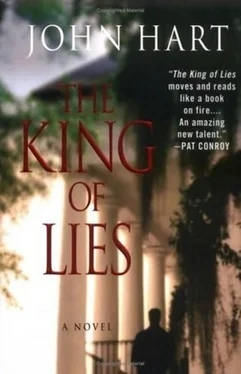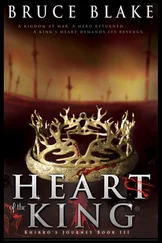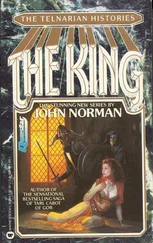A row of vinyl seats lined one wall. Two more halls ran away in opposite directions, their polished floors agleam with the reflection of fluorescent lighting from above. Voices echoed around us: passing nurses, medical students, a box on the wall paging doctors. Across from us was a blue swinging door beneath a sign that said EMPLOYEES ONLY.
“This is the place,” Hank said. I looked around again, sure I must have missed something. Hank fished a plastic identification badge from his jacket pocket and clipped it onto his shirt. It had his picture on it, a name I’d never heard before, and the name of the hospital. It looked just like every other employee identification badge I’d seen since we entered.
“Where did you get that?” I whispered.
“It’s forged,” he replied curtly.
“But…”
He flashed his crooked grin. “I told you I’d been here before.”
I nodded. “Okay. What do you want me to do?”
“Wait here,” he said. I followed his gaze to the row of uncomfortable red vinyl seats. “Read the paper. This might take a while.”
“I want to come,” I said.
“I know you do, and I don’t blame you, but people will talk to one person when they might not talk to two. One is a friendly chat. Two is an interrogation.”
He read the emotion on my face, knew how important this was to me.
“Relax, Work. Read the paper. If there is an answer to be found here, I’ll find it. Okay? This is what I do. Trust me.”
“I don’t like this.”
“Don’t think about it.” Hank turned away, then just as quickly turned back. “Give me the sports section,” he said. I fumbled it out of the paper and handed it to him. He rolled it up and saluted me with it. “Icebreaker,” he said. “All-important in this business.”
I sat stiffly on the hard chair and watched as Hank walked boldly through the door designated for employees only. He didn’t look back, and when the door swung shut, it swallowed him whole.
I settled back. I opened the paper and stared blankly at words that swam. When people passed, I tried to look normal, as if I belonged, but it was hard, for in my racing mind I was a criminal.
I sat there for what my watch said was only fifty-five minutes. The watch lied. It was a lifetime.
Time and again, that blue door swung open. A black man came out the first time, then a white woman and a fat man who could never be mistaken for Hank Robins. Another woman. Two men. An endless stream, and they all wore the same badge of identification. Again and again the door swung wide, and each time it did, the spring of my body wound a little tighter. Hank had been found out. He wasn’t coming.
Then I saw him, in the brief flash as the door swung shut behind an old man pushing a bucket. He was coming out, and the next time the door opened, it was for him. He did not smile, but in his eyes I saw a fierce satisfaction. He took me by the arm before I could say a word; then we were walking, our footsteps loud in the hard-tiled and resonant halls that were the arteries of this place.
“That wasn’t so bad, was it?” he asked in a voice so normal, it surprised me. I’d expected a whisper.
“Did you get it?” I asked, meaning the answer to our question.
The fierceness moved from his eyes to his mouth, and he smiled. “Oh yes. I got it.”
I wanted to shake it out of him. “And?”
“And it’s something.”
We walked in a silence that just about killed me, but eventually we made it to the car. Hank slipped behind the wheel, started the engine, and hit the door-lock button. He still had not said a word. He backed out of the parking spot and navigated us through the inland sea of parked vehicles. Finally, he looked at me. “Buckle up,” he said.
“Are you fucking with me?” I asked. “Because this is not a good time.” He did not respond, and his eyes remained steady on the road.
“I’m just getting my thoughts together, Work. There’s a lot to say and I’m trying to figure out the best way to do it. I don’t want to freak you out.”
“You’re freaking me out right now.”
But he would not be rushed, and he kept his mouth shut until we were on Interstate 40, driving west at exactly nine miles over the speed limit.
“Have you ever heard of East Bend?” he finally asked.
“Maybe. I think so.”
“It’s a little place. Pretty, with horses. It’s on the Yadkin River, not far from Winston-Salem.”
Headlights flashed on Hank’s face from across the grassy divide, unidentified cars driven by nameless people. In the dark intervals, Hank’s face was a blurred profile. Then he turned to look at me.
“You should go there sometime. There’s this little vineyard there, right on the river…”
“Is there some reason you’re stalling?”
He looked at me again, and headlights filled the space around us. “Alex is from there. It’s where she grew up. For the first fourteen years anyway.”
“And?”
“Look, Work… the details are sketchy. All I’ve got is what the nursing assistant told me, and bought information isn’t always reliable. I haven’t verified any of this.”
“Fine. You’re absolved of the consequences of any misinformation. Just tell me what you heard.”
“She killed her father, Work. She cuffed him to the bed and set it on fire.”
“What?”
“She was fourteen. Her mother was in the bed, too, but she survived. It was Daddy she was after.” He paused. “And she got him, too. Cooked him right to the bed.”
I felt Hank’s eyes on me, gauging my reaction, but there was none; then Hank continued, his voice a flat line.
“She waited for him to stop screaming, and then she called 911 and walked out of the house; she watched it burn. When the fire truck arrived, she met them at the curb, said her mother might still be alive. They found her under the bedroom window, burned over seventy percent of her body. She was cut up pretty bad, too, from diving through the glass. When the police showed up, the girl told them what she’d done. She didn’t lie about it, but she didn’t gloat, either. Rumor is, she didn’t shed a single tear. The nursing assistant didn’t know if she went to trial or not, but the state sent her to psychiatric lockup. She spent four years at Dorothea Dix, but she was a minor when she did the job. So when she turned eighteen, they released her to Charter Hills, where she met Jean.”
“That was only three years ago,” I said.
“She’s young.”
“She doesn’t look it.”
“She’s led a hard life, no mistake there. It’ll age a person.”
“Are you sympathizing with her?” I asked.
“Not at all,” Hank said. “But they couldn’t tell me what went down before she killed him. She must have had a reason, and it’s not too hard to guess what it was.” I sensed him shrug. “I have a soft spot for hard-luck cases.” He left the rest unspoken. I didn’t have the details, but I knew that Hank’s childhood had been no picnic.
The silence drew out. Cars passed us.
“That’s it?” asked. “That’s all we know?”
“I tried to buy a copy of her file, but the guy wouldn’t go there. He said gossip was one thing, stealing documents was another; but he was pretty sure of what he told me. Said it was common knowledge among the staff.”
Hank checked his mirror and passed a pickup truck. One of its headlights was out, so it seemed to wink at us as we passed. I saw the sign for Interstate 85, and we remained silent until we’d left I-40 and pointed south, toward Jean and the woman who guarded so well the secrets of her violent past.
Hank reached into his pocket and handed me back two of the hundred-dollar bills. “It only took one,” he said.
“So that’s it?”
Читать дальше












